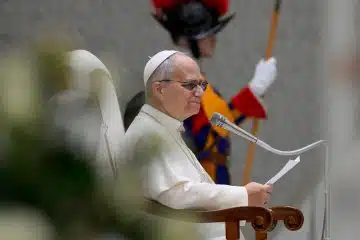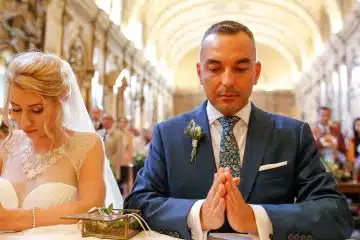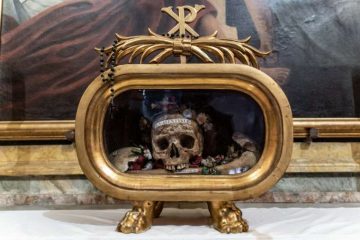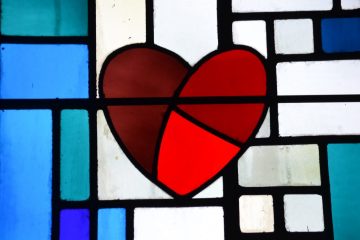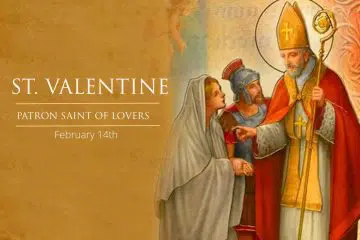Continence for the Kingdom of Heaven (Part 1)
Note: This article is part of an ongoing series on Pope St. John Paul II’s “Theology of the Body.”
In his reflections on “eschatological man” (i.e., the human person in light of our ultimate destiny with God in the resurrection of the body and the new creation), Pope St. John Paul II meditated deeply on our Lord’s teaching that “those who are accounted worthy to attain to that age and to the resurrection from the dead neither marry nor are given in marriage” (Lk. 20:35). As we have explored this teaching the last few months, we have seen that our beatific union with God will completely fulfill all our longings for love and communion.
We will be fully permeated by God—body and soul—and participate in the inner exchange of love at the very heart of the Blessed Trinity. We will also experience the most profound communion with all other human persons who have similarly attained eternal life. As a result, earthly marriage, by which we belong to another in an exclusive way, no longer makes sense. This led Pope St. John Paul II to a startling conclusion: in the resurrection, “the virginal state of the body will manifest itself… as the fulfillment of the spousal meaning of the body” (TOB 68.3).
Unpacking this connection between the spousal meaning of the body and virginity led Pope John Paul to meditate on “continence for the kingdom of heaven.” This refers to those states of life in the Church in which a man or woman voluntarily renounces earthly marriage and takes a vow of virginity or celibacy. John Paul II saw an essential link between marriage and continence for the kingdom. In his 1981 exhortation on the Christian family, he wrote: “As an incarnate spirit, that is a soul which expresses itself in a body and a body informed by an immortal spirit, man is called to love in his unified totality. Love includes the human body, and the body is made a sharer in spiritual love. Christian revelation recognizes two specific ways of realizing the vocation of the human person in its entirety, to love: marriage and virginity or celibacy. Either one is, in its own proper form, an actuation of the most profound truth of man, of his being ‘created in the image of God’” (no. 11).
In this passage, we see a clear expression of the late pope’s understanding of the vocation to love, i.e., the fundamental vocation of every human being is to make a total gift of self. This vocation flows from our being made in the image of God who is Love—Father, Son, and Holy Spirit. Furthermore, our very existence is a pure gift from God. This “giftness” structures our entire being and essence such that our deepest fulfillment as persons is to freely become a self-gift to others. While we can make a gift of self to others in innumerable ways, the most complete form is to make a total gift of self by which we belong to another in an exclusive and permanent way. St. John Paul taught that there are two states of life in the Church that embody this total gift of self: marriage and continence for the kingdom.
Both marriage and continence for the kingdom fulfill the spousal meaning of the body, which refers to the call and capacity of the human person to make a total gift of himself in love. In Christian marriage, men and women make a total gift of self through their nuptial vows to one another in Christ. In various forms of consecrated life, men and women freely take vows or promises to Christ by which they renounce earthly marriage so as to make “an exclusive gift of self to God” (TOB 73.1), thereby following Christ more closely and dedicating themselves more exclusively to the building of the Kingdom of God. In this state, “the human being is awaiting, also in a bodily way, the eschatological marriage of Christ with the Church… The celibate person thus anticipates in his or her flesh the new world of the future resurrection” (John Paul II, 1981, no. 16). For this reason, Pope St. John Paul II referred to continence for the kingdom as an “eschatological sign” (TOB 73.5) that reminds us that our ultimate fulfillment is not found in this life but will come through beatific union with God in the world to come.
 Dr. Andrew Sodegren, [email protected], is a Catholic psychologist and director of psychological services for Ruah Woods. He speaks on the integration of psychology and the Catholic faith. He and his wife, Ellie, have five children.
Dr. Andrew Sodegren, [email protected], is a Catholic psychologist and director of psychological services for Ruah Woods. He speaks on the integration of psychology and the Catholic faith. He and his wife, Ellie, have five children.
This article appeared in the April 2025 edition of The Catholic Telegraph Magazine. For your complimentary subscription, click here.





